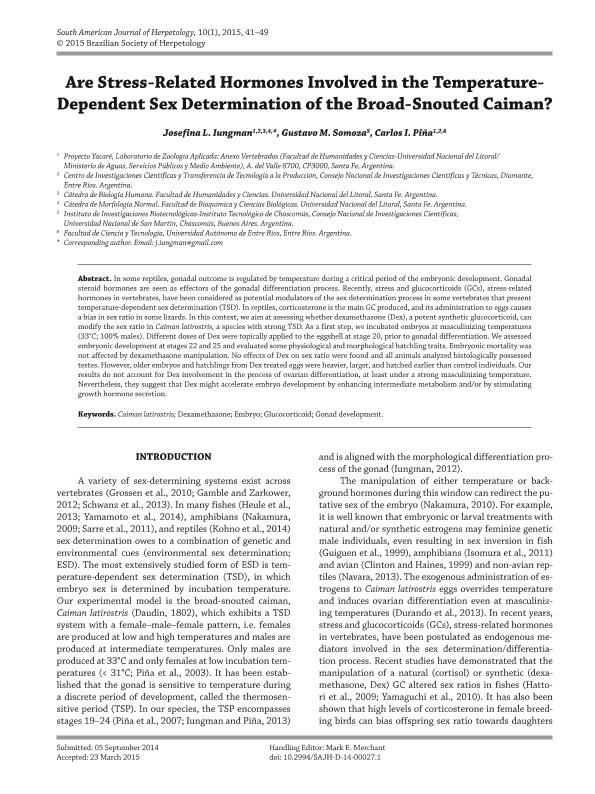Mostrar el registro sencillo del ítem
dc.contributor.author
Iungman, Josefina Luciana

dc.contributor.author
Somoza, Gustavo Manuel

dc.contributor.author
Piña, Carlos Ignacio

dc.date.available
2019-06-14T18:00:02Z
dc.date.issued
2015-04
dc.identifier.citation
Iungman, Josefina Luciana; Somoza, Gustavo Manuel; Piña, Carlos Ignacio; Are Stress-Related Hormones Involved in the Temperature-Dependent Sex Determination of the Broad-Snouted Caiman?; Sociedade Brasileira de Herpetologia; South American Journal of Herpetology; 10; 1; 4-2015; 41-49
dc.identifier.issn
1808-9798
dc.identifier.uri
http://hdl.handle.net/11336/78357
dc.description.abstract
In some reptiles, gonadal outcome is regulated by temperature during a critical period of the embryonic development. Gonadal steroid hormones are seen as effectors of the gonadal differentiation process. Recently, stress and glucocorticoids (GCs), stress-related hormones in vertebrates, have been considered as potential modulators of the sex determination process in some vertebrates that present temperature-dependent sex determination (TSD). In reptiles, corticosterone is the main GC produced, and its administration to eggs causes a bias in sex ratio in some lizards. In this context, we aim at assessing whether dexamethasone (Dex), a potent synthetic glucocorticoid, can modify the sex ratio in Caiman latirostris, a species with strong TSD. As a first step, we incubated embryos at masculinizing temperatures (33°C; 100% males). Different doses of Dex were topically applied to the eggshell at stage 20, prior to gonadal differentiation. We assessed embryonic development at stages 22 and 25 and evaluated some physiological and morphological hatchling traits. Embryonic mortality was not affected by dexamethasone manipulation. No effects of Dex on sex ratio were found and all animals analyzed histologically possessed testes. However, older embryos and hatchlings from Dex treated eggs were heavier, larger, and hatched earlier than control individuals. Our results do not account for Dex involvement in the process of ovarian differentiation, at least under a strong masculinizing temperature. Nevertheless, they suggest that Dex might accelerate embryo development by enhancing intermediate metabolism and/or by stimulating growth hormone secretion.
dc.format
application/pdf
dc.language.iso
eng
dc.publisher
Sociedade Brasileira de Herpetologia
dc.rights
info:eu-repo/semantics/openAccess
dc.rights.uri
https://creativecommons.org/licenses/by-nc-sa/2.5/ar/
dc.subject
Caiman Latirostris
dc.subject
Dexamethasone
dc.subject
Embryo
dc.subject
Glucocorticoid
dc.subject
Gonad Development
dc.subject.classification
Otras Ciencias Biológicas

dc.subject.classification
Ciencias Biológicas

dc.subject.classification
CIENCIAS NATURALES Y EXACTAS

dc.title
Are Stress-Related Hormones Involved in the Temperature-Dependent Sex Determination of the Broad-Snouted Caiman?
dc.type
info:eu-repo/semantics/article
dc.type
info:ar-repo/semantics/artículo
dc.type
info:eu-repo/semantics/publishedVersion
dc.date.updated
2019-06-11T17:44:52Z
dc.identifier.eissn
1982-355X
dc.journal.volume
10
dc.journal.number
1
dc.journal.pagination
41-49
dc.journal.pais
Brasil

dc.description.fil
Fil: Iungman, Josefina Luciana. Provincia de Entre Ríos. Centro de Investigaciones Científicas y Transferencia de Tecnología a la Producción. Universidad Autónoma de Entre Ríos. Centro de Investigaciones Científicas y Transferencia de Tecnología a la Producción. Consejo Nacional de Investigaciones Científicas y Técnicas. Centro Científico Tecnológico Conicet - Santa Fe. Centro de Investigaciones Científicas y Transferencia de Tecnología a la Producción; Argentina. Universidad Nacional del Litoral. Facultad de Humanidades y Ciencias. Departamento de Ciencias Naturales. Laboratorio de Zoología Aplicada: Anexo Vertebrados (FHUC-UNL/MASPyMA); Argentina. Universidad Nacional del Litoral. Facultad de Bioquímica y Ciencias Biológicas; Argentina
dc.description.fil
Fil: Somoza, Gustavo Manuel. Consejo Nacional de Investigaciones Científicas y Técnicas. Centro Científico Tecnológico Conicet - La Plata. Instituto de Investigaciones Biotecnológicas. Instituto de Investigaciones Biotecnológicas "Dr. Raúl Alfonsín" (sede Chascomús). Universidad Nacional de San Martín. Instituto de Investigaciones Biotecnológicas. Instituto de Investigaciones Biotecnológicas "Dr. Raúl Alfonsín" (sede Chascomús); Argentina
dc.description.fil
Fil: Piña, Carlos Ignacio. Provincia de Entre Ríos. Centro de Investigaciones Científicas y Transferencia de Tecnología a la Producción. Universidad Autónoma de Entre Ríos. Centro de Investigaciones Científicas y Transferencia de Tecnología a la Producción. Consejo Nacional de Investigaciones Científicas y Técnicas. Centro Científico Tecnológico Conicet - Santa Fe. Centro de Investigaciones Científicas y Transferencia de Tecnología a la Producción; Argentina. Universidad Autónoma de Entre Ríos. Facultad de Ciencia y Tecnología; Argentina. Universidad Nacional del Litoral. Facultad de Humanidades y Ciencias. Departamento de Ciencias Naturales. Laboratorio de Zoología Aplicada: Anexo Vertebrados (FHUC-UNL/MASPyMA); Argentina
dc.journal.title
South American Journal of Herpetology
dc.relation.alternativeid
info:eu-repo/semantics/altIdentifier/url/http://www.bioone.org/doi/abs/10.2994/SAJH-D-14-00027.1
dc.relation.alternativeid
info:eu-repo/semantics/altIdentifier/doi/http://dx.doi.org/10.2994/SAJH-D-14-00027.1
Archivos asociados
